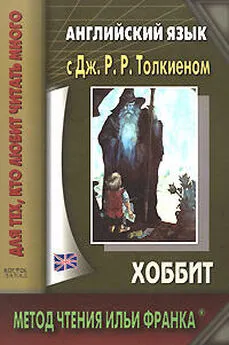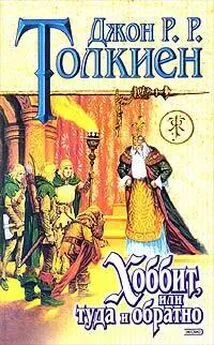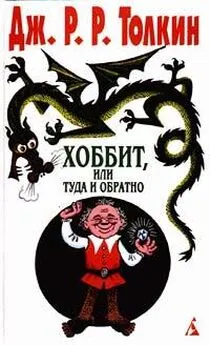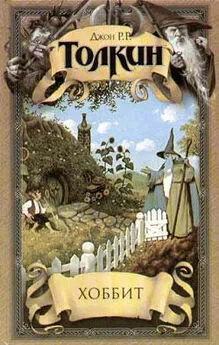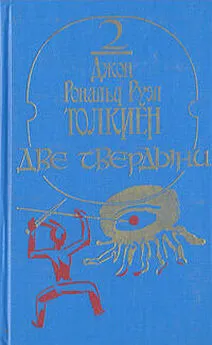Джон Толкиен - Английский язык с Дж. Р. Р. Толкиеном. Хоббит
- Название:Английский язык с Дж. Р. Р. Толкиеном. Хоббит
- Автор:
- Жанр:
- Издательство:АСТ, Восток-Запад
- Год:2008
- Город:Москва
- ISBN:978-5-17-048593-2, 978-5-478-00597-9
- Рейтинг:
- Избранное:Добавить в избранное
-
Отзывы:
-
Ваша оценка:
Джон Толкиен - Английский язык с Дж. Р. Р. Толкиеном. Хоббит краткое содержание
В книге предлагается произведение на английском языке Джона Р. Р. Толкиена «Хоббит», адаптированное (без упрощения текста оригинала) по методу Ильи Франка. Уникальность метода заключается в том, что запоминание слов и выражений происходит за счет их повторяемости, без заучивания и необходимости использовать словарь.
Пособие способствует эффективному освоению языка, может служить дополнением к учебной программе.
Предназначено для студентов, для изучающих английский язык самостоятельно, а также для всех интересующихся английской культурой.
Пособие подготовила Ольга Ламонова.
Английский язык с Дж. Р. Р. Толкиеном. Хоббит - читать онлайн бесплатно полную версию (весь текст целиком)
Интервал:
Закладка:
imprison [ɪmˈprɪz (ǝ) n] reveal [rɪˈvi: l] ransom [ˈræns (ǝ) m] invisible [ɪnˈvɪzǝb (ǝ) l]
So it was that Bilbo was able to take secretly Thorin’s message to each of the other imprisoned dwarves, telling them that Thorin their chief was also in prison close at hand, and that no one was to reveal their errand to the king, not yet, not before Thorin gave the word. For Thorin had taken heart again hearing how the hobbit had rescued his companions from the spiders, and was determined once more not to ransom himself with promises to the king of a share in the treasure, until all hope of escaping in any other way had disappeared; until in fact the remarkable Mr. Invisible Baggins (of whom he began to have a very high opinion indeed) had altogether failed to think of something clever.
The other dwarves quite agreed (остальные гномы вполне согласились) when they got the message (когда они получили это сообщение). They all thought (все они подумали) their own shares in the treasure (что их собственные доли в сокровище) (which they quite regarded as theirs (которое они вполне рассматривали как свое собственное), in spite of their plight (несмотря на свое положение; plight — состояние, положение — обыкн. плохое, трудное ) and the still unconquered dragon (и все еще непобежденного дракона; to conquer — завоевывать, покорять, побеждать )) would suffer seriously (серьезно пострадают) if the Wood-elves claimed part of it (если Лесные Эльфы предъявят свои права на его часть; to claim — требовать, претендовать ), and they all trusted Bilbo (и все они доверяли Бильбо). Just what Gandalf had said would happen; you see (именно то, что /как/ сказал Гэндальф, /и/ случится, видите ли). Perhaps that was part of his reason (возможно, это была одна из его причин: «часть его причины»; part — часть, доля, сторона, аспект ) for going off and leaving them (для того чтобы уехать и оставить их).
Bilbo, however (Бильбо, однако), did not feel nearly so hopeful (не чувствовал себя настолько же оптимистично; nearly — почти, около, близко; hopeful — надеющийся, свойственный оптимисту ) as they did (как они). He did not like being depended on by everyone (ему не нравилось, что на него надеялся каждый; to depend — зависеть; полагаться ), and he wished he had the wizard at hand (и ему очень хотелось, чтобы поблизости был волшебник).
plight [plaɪt] unconquered [ʌnˈkɔŋkǝd] seriously [ˈsɪ (ǝ) rɪǝslɪ]
The other dwarves quite agreed when they got the message. They all thought their own shares in the treasure (which they quite regarded as theirs, in spite of their plight and the still unconquered dragon) would suffer seriously if the Wood-elves claimed part of it, and they all trusted Bilbo. Just what Gandalf had said would happen, you see. Perhaps that was part of his reason for going off and leaving them.
Bilbo, however, did not feel nearly so hopeful as they did. He did not like being depended on by everyone, and he wished he had the wizard at hand.
But that was no use (но это было бесполезно): probably all the dark distance of Mirkwood (возможно что все темное расстояние Мрачного леса) lay between them (лежало между ними). He sat and thought and thought (он сидел и думал и думал), until his head nearly burst (пока его голова чуть не лопнула; to burst — взрываться ), but no bright idea would come (но никакая блестящая идея не приходила). One invisible ring was a very fine thing (одно невидимое колечко — это очень хорошо), but it was not much good among fourteen (но оно было почти бесполезным: «от него было не много пользы среди» для четырнадцати). But of course, as you have guessed (но конечно, как вы уже догадались), he did rescue his friends in the end (он действительно спас своих друзей, в конце концов), and this is how it happened (и вот как это случилось).
One day, nosing and wandering about (однажды, выискивая и шлясь повсюду; to nose — нюхать, чуять; совать свой нос ) Bilbo discovered a very interesting thing (Бильбо обнаружил одну очень интересную вещь): the great gates were not the only entrance to the caves (огромные ворота были не единственным входом в пещеры). A stream flowed (какая-то речка текла) under part of the lowest regions of the palace (под частью самых нижних уровней дворца; region — область, сфера, район ), and joined the Forest River (и впадала в Лесную Речку; to join — соединять, связывать ) some way further to the east (немного дальше к востоку), beyond the steep slope (за крутым склоном) out of which the main mouth opened (с которого-то и открывался главный вход). Where this underground watercourse (где этот подземный поток) came forth from the hillside (выходил наружу со склона холма; forth — вперед, дальше, наружу ) there was a water-gate (там находился затвор шлюза: «водные ворота»).
burst [bǝ: st] watercourse [ˈwɔ: tǝkɔ: s] water-gate [ˈwɔ: tǝɡeɪt]
But that was no use: probably all the dark distance of Mirkwood lay between them. He sat and thought and thought, until his head nearly burst, but no bright idea would come. One invisible ring was a very fine thing, but it was not much good among fourteen. But of course, as you have guessed, he did rescue his friends in the end, and this is how it happened. One day, nosing and wandering about. Bilbo discovered a very interesting thing: the great gates were not the only entrance to the caves. A stream flowed under part of the lowest regions of the palace, and joined the Forest River some way further to the east, beyond the steep slope out of which the main mouth opened. Where this underground watercourse came forth from the hillside there was a water-gate.
There the rocky roof (там скалистый свод; roof — крыша, кровля; rock — скала, утес ) came down close to the surface of the stream (спускался близко к поверхности потока), and from it a portcullis could be dropped (и с него опускалась решетка: «решетка могла быть опущена»; portcullis — опускная решетка ) right to the bed of the river (прямо до русла реки) to prevent anyone coming in or out that way (что бы не позволить никому войти или уйти: «прийти внутрь или наружу» этим путем; to prevent — предотвратить, не допускать ). But the portcullis was often open (но опускная решетка часто были поднята: «открыта»), for a good deal of traffic went out and in (так как довольно интенсивное движение как наружу, так и внутрь осуществлялось: «шло наружу и внутрь»; traffic — движение, грузооборот, торговля ) by the water — gate (сквозь шлюз; gate — ворота; шлюз ). If anyone had come in that way (если кто-то зашел бы по этому пути), he would have found himself (он оказался бы) in a dark rough tunnel (в темном труднопроходимом туннеле; rough — неровный, грубый; труднопроходимый ) leading deep into the heart of the hill (ведущем глубоко в самое сердце холма); but at one point (но в одном месте) where it passed under the caves (где он проходил под пещерами) the roof had been cut away (свод был срезан) and covered with great oaken trapdoors (и покрыт огромными деревянными вентиляционными дверьми; trap-door — люк, опускная дверь; горн. вентиляционная дверь ). These opened upwards into the king’s cellars (они: «эти» открывались вверх, в погреба короля). There stood barrels, and barrels, and barrels (там стояли бочки, и бочки и бочки; barrel
— бочка, бочонок ); for the Wood-elves (так как Лесные Эльфы), and especially their king (и в особенности их король), were very fond of wine (очень любили вино), though no vines grew in those parts (хотя в тех краях не росла виноградная лоза; vine — виноградная лоза ). The wine, and other goods (вино и другие товары), were brought from far away (привозились: «были привозимы» издалека), from their kinsfolk in the South (от их родни с Юга), or from the vineyards of Men (или с виноградников Людей) in distant lands (из далеких земель).
surface [ˈsǝ: fɪs] portcullis [pɔ: tˈkʌlɪs] trap-door [ˈtræpdɔ: ] kinsfolk [ˈkɪnzfǝʋk]
There the rocky roof came down close to the surface of the stream, and from it a portcullis could be dropped right to the bed of the river to prevent anyone coming in or out that way. But the portcullis was often open, for a good deal of traffic went out and in by the water-gate. If anyone had come in that way, he would have found himself in a dark rough tunnel leading deep into the heart of the hill; but at one point where it passed under the caves the roof had been cut away and covered with great oaken trapdoors. These opened upwards into the king’s cellars. There stood barrels, and barrels, and barrels; for the Wood-elves, and especially their king, were very fond of wine, though no vines grew in those parts. The wine, and other goods, were brought from far away, from their kinsfolk in the South, or from the vineyards of Men in distant lands.
Hiding behind one of the largest barrels (прячась за одной из самых огромных бочек) Bilbo discovered the trapdoors (Бильбо обнаружил эти люки) and their use (и их предназначение), and lurking there (и, притаившись там в засаде; to lurk — скрываться, притаиться ), listening to the talk of the king’s servants (и слушая разговоры королевских слуг), he learned how the wine and other goods (он узнал, как вино и другие товары) came up the rivers (поступают по рекам), or over land (или по земле), to the Long Lake (к Длинному Озеру). It seemed a town of Men still throve there (казалось = видимо, что какой-то город Людей все еще процветал там; tothrive (throve, thriven) — процветать, преуспевать ), built out on bridges far into the water (построенный на сваях: «мостах» далеко на воде) as a protection against enemies of all sorts (в качестве защиты от врагов любого рода), and especially against the dragon of the Mountain (и в особенности против дракона с Горы). From Lake-town (с Города-на-Озере) the barrels were brought up the Forest River (бочки привозились вверх по Лесной Реке). Often they were just tied together (зачастую они были просто связаны вместе) like big rafts (подобно большим плотам) and poled or rowed up the stream (и передвигались с помощью багров или весел вверх по течению; to pole — зд. отталкивать, передвигать судно шестами, баграми или веслами; to row — грести, перевозить на лодке ); sometimes they were loaded (иногда они нагружались) on to flat boats (на плоские лодки).
Читать дальшеИнтервал:
Закладка:
